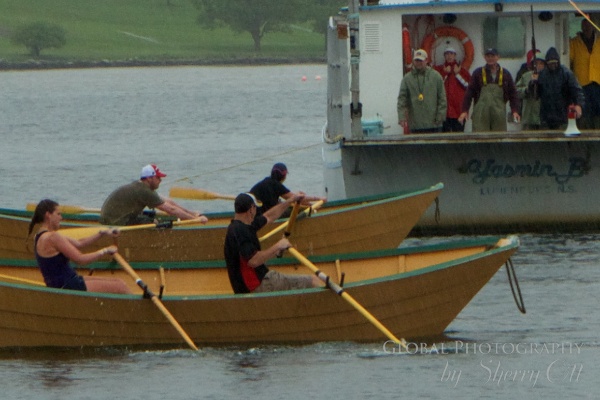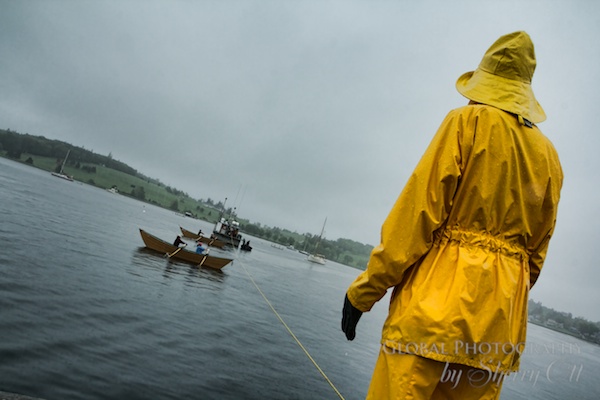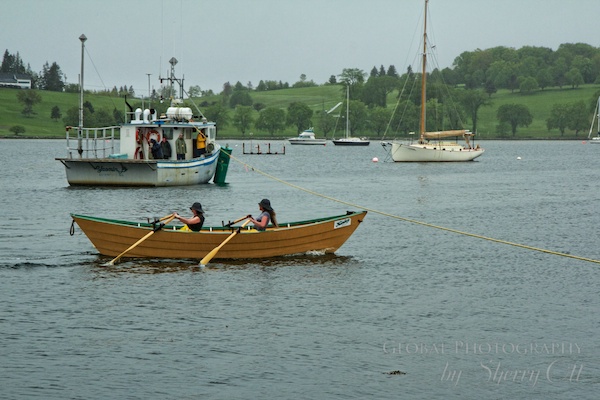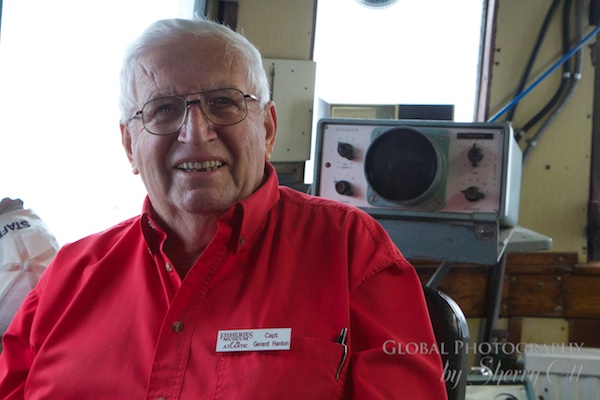
“We haven’t cancelled a race in 61 years.” Marlene said to me as drops of rain poured off her raincoat as if it were Devil’s Throat of Iguazu Falls.
“Wow, that’s pretty impressive. You guys sure are hearty.” I replied as I tried to duck under the temporary tent awning for a break from the sheets of rain pelting me.
Today’s headlines read “Southwest Nova Scotia likely to receive the worst from first named storm of the season”, and I was at the heart of it in Lunenburg Nova Scotia – a little fishing town south of Halifax.

I had been watching the sheets of rain pound the little harbor outside my window at Lunenburg Arms hotel and was intrigued by the local people who seemed to be unaffected by these headlines. A small crowd, dressed in full proper rain gear, were gathering around the docks and getting in and out of boats. I love it when locals embrace the weather they are given – it was one of my favorite things about places like Minnesota in the winter and Vietnam during rainy season. You can’t change it – so you might as well enjoy it.
I needed to know more, I needed to leave the comfort of my plush, dry room and see what was going on – the curiosity was killing me. I borrowed my mom’s rain coat, put on my gortex running shoes, a baseball hat, and I outfitted my camera with my LensCoat Raincoat and thought about how I would be putting this camera accessory to the ultimate test, silently praying that it worked as advertised. I didn’t have any rain gear to cover my legs – but decided that it didn’t really matter if my yoga pants got wet, 80% of me and my gear were covered – good enough.
I went down to the docks and stood next to some people in full rain gear and wellies. We watched as people bailed water out of yellow, wooden boat. I asked the woman next to me who was dressed for a role in the Perfect Storm what this was all about. That’s when I was first introduced to the culture of the dory in Lunenburg.
In all honesty Lunenburg is a town for tourists. You can golf, shop, and eat to your heart’s content while being visually stimulated by this picture perfect setting filled with colorful wooden homes and small town charm. However if you just dig a little deeper past the picture perfect colorful wooden homes and abundance of shops full of knick knacks – you will find the true Lunenberg – a 260 year old town with a huge fishing history. This town had grit – and if you are willing to put in some time outside of the shops you just may be able to find it.
Dory Racing
The women in the rain gear explained to me that today was the Dory race to determine what teams would go to Glouster Massachusettes to compete later in the month. I had millions of questions to follow – but first – what is a dory?
Dories are traditional simple fishing boat known for their sea worthiness. They were used for fishing because bigger boats could stack the dories and take them out to see. The dory would typically be manned by a couple of young fisherman and sent out to put out lines and catch fish.
However this race had been a tradition starting in 1952 to settle a feud between fisherman on who had the better dory rowers – Glouster or Lunenburg. Fast forward 61 years later and I was standing in the rain with a crowd of die hard locals watching the qualifying races.
I met the president of the Canadian Dory Racing Association under the tent of spectators on the docks. She had a walkie talkie trying to organize what seemed to be chaos. However, she was more than happy to have an out of town visitor asking questions and taking pictures. She introduced me to racers and other people in the CDRA – and she even gave me a free book on the history of the dory.

The winds blew the rain sideways and I watched as the teams made their way out in horrible conditions to the turn around point and then back – typically ½ mile distance is raced. It seemed to be a really demanding race – but made worse by the conditions that day. But even more fun than the race itself was meeting the locals and learning about this cool slice of Nova Scotia history that has evolved into modern day.
The races are held in June every year – check the CDRA website for exact dates.
Stories of the Fishing Industry

I listened in awe as retired fishing captain Gerard Hanlon told me about his life growing up as a fisherman. He reminded me of my own father, but saltier. He had this life that I could hardly comprehend – it was hard, it was hands-on, and it was all about fishing. Captain Gerard was working at the Atlantic Fisheries Museum in Lunenburg as a Heritage Interpreter aboard the Cape Sable, a 1962 steel-hulled side trawler (nets hung off the sides), that is part of the museum and is docked at the museum. I learned that the trawler is actually the type of vessel that eventually replaced the dory schooners.
Captain Gerard basically sat at the ship’s bridge and greeted people who visited the ship and answered any questions they had about the fishing industry and the ship.
However the moment I walked in from the rainy deck and saw him on the bridge I knew I wanted to learn more about Captain Gerard. I grew up in the land-locked Midwest, so the idea of being a fishing captain was completely foreign to me.
I intently listened to Captain Gerard as he told me the story of how he became the captain of a fishing boat at the age of 18 – yes…18. He was responsible for the fishing boat and a crew of men and their lives and livelihood at such a young age. I couldn’t even fathom how he made this work. Then again he already had 4 years of experience as he was fishing as part of a crew working in dories at the young age of 14. The fact that he came back alive (which many times dory fisherman perished when bad weather rolled in and their ships left them or couldn’t find them) tells me that he must have been good at what he did.
I asked about his family and his life now. His wife had gone to work now since she spent her life taking care of the children and family since he was often gone for weeks at a time. They now have grandchildren and one of his daughters actually races dories. I continued to explore the ship and the living quarters in a sense of amazement on what it would be like to work in a career like this. Especially since I easily get seasick!
Knot Bar
I was tired of the tourist restaurants in the town, and was energized by the fact that I had met so many locals that day in the rain that I decided I would get their advice on where to eat in Lunenburg. They all led me to a bar/pub called the Knot. Mom and I decided that we would take the local advice and check it out. We walked into the back entrance and immediately I knew we had found the local hangout.
Every rustic table was packed full of people of all ages, TV’s were on, and waiters and waitresses ran around with mugs of beer and plates of pub food. It felt comfortable, homey, and absolutely where I wanted to be. We found a table and ordered some beer and bacon wrapped scallops. I looked around and was reminded of why it’s always great to take local advice.
After these rainy day experiences in Lunenburg, I had a whole different opinion of the town. I felt more connected to it. I had found my way past the souvenir shops and beautiful tourist veneer. I had found the real Lunenburg.
Disclosure: My Nova Scotia trip was supported by Visit Nova Scotia. However all of the opinions expressed here are my own.

Sherry Ott is a refugee from corporate IT who is now a long term traveler, blogger, and photographer. She’s a co-founder of Briefcasetobackpack.com, a website offering career break travel inspiration and advice.
Additionally, she runs an around the world travel blog writing about her travel and expat adventures at Ottsworld.com.com.








